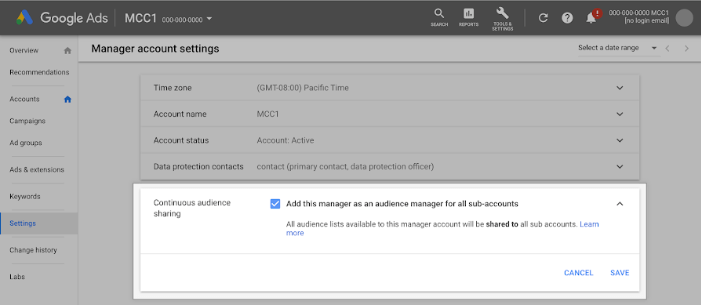What: Google has introduced a new feature called continuous audience sharing which will allow PPC practitioners to set up audience lists in sub accounts far quicker than ever before.
When: February 18th, 2020
Where: Google Ads Search and Display
Why: Previously a more manual process to set up audience lists, now all that is required is for a setting to be changed in the Google Account MCC.
How: Continuous Audience Sharing can now be activated in the MCC account within the setting tab. This will allow all re-marketing lists within a manager account to be shared throughout its sub accounts.
The trusty old audience list offers the inquisitive Google Ads practitioner scope to humanise what would be, under other circumstances, anonymous clicks and site visits. With audience lists, we can begin to attribute the interests and user journeys to that which eventually led consumers to land on clients’ sites and warmly beckon shoppers back to the site by using re-marketing lists, when their casual browsing took them elsewhere. Such a powerful tool, whilst fairly straight foreword to set up, did involve a decidedly manual process, but this is no longer the case.
Alongside a new feature called Continuous Audience Sharing launched by Google last month, we can now set up audience lists within manager and sub accounts far quicker than ever before. Account managers can simply flick a switch (pictured below) and all audience lists previously set up in the manager account will then be shared across all sub accounts.

Where more pressing account priorities meant that not all audience lists could be set up in every campaign of every account, Google have saved us not only time, but also a series of missed opportunities in the form of an unprecedented level of demographic data and user targeting. And what’s more, the advertiser maintains full control of which audience lists are active.
Just on a final note: The speed with which audience lists can now be set up across accounts does present great opportunities to save on time through automation, but don’t forget that you may be sharing confidential or proprietary information in the process.
It’s therefore paramount to make sure that all privacy policies for an account are taken into consideration before sharing is activated.





